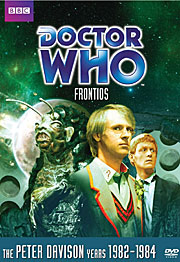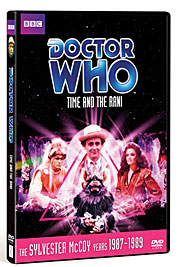Mark Strickson
Time and the Rani
- Sci-Fi
- 1984
- Buy the DVD
Reviewed by Ross Ruediger
()
t’s been said by more than one person that Peter Davison didn’t “find” the Fifth Doctor until his final story, “The Caves of Androzani.” That is, of course, utter codswallop, but to those who do believe it, I point you in the direction of “Frontios,” which shows Davison giving one of the strongest performances of his tenure.
The TARDIS has drifted into the far, far future and come upon the planet Frontios, where the last remnants of the human race have taken up residence (it possibly takes place after the new series episode, “The End of the World”). They’ve been there for over 50 years, barely hanging on, and seemingly in the midst of a long-term war with invisible invaders from the stars. During a meteor bombardment of the planet’s surface, the TARDIS is forced to make a landing. Because the colony is so fresh and their situation so precipitous, the Doctor (Davison) must be careful in his interference, and he makes the point time and again that should anyone ask, “We were never here.” Exactly who’s attacking Frontios, why is Turlough (Mark Strickson) raving like a madman, and how come Tegan’s (Janet Fielding) ass never looked like that before?
Obviously, that last remark was meant to provoke a laugh, but it’s true: Fielding’s black leather ‘80s mini-skirt looks mighty tight in “Frontios.” Tegan’s a companion that never really gets her “sexy due,” but between a story like this and the recently released Mara double feature, maybe it’s time to do a little retro-salivation. Look past her bitchiness and behold the bitch. Turlough also gets some good screen time, as yet another piece of his character puzzle is put into place, and, as previously stated, Davison is in prime form taking charge and cracking wise. One of the tale’s best jokes comes from the Doctor trying to pass Tegan off as a somewhat defective android: “I got this one cheap because the walk’s not quite right.” It doesn’t hurt that he’s working from an ambitious script by Chris Bidmead, as demonstrated by the fact that, perhaps more than anything else, this is the story known as “the one where the TARDIS blows up.” (This was years before Steven Moffat blew it up again.)
On the downside, however, are the production values. Now, I generally shy away from picking on those aspects of the classic series, because it’s like kicking a puppy, but in this particular case they warrant some discussion. “Frontios” is full of big ideas and even bigger imagery that the series just isn’t qualified to bring to life, and one wonders how the concept even got the greenlight. (Try imagining its script edited down to 45 minutes and remade for the new series with a proper budget.) While the destroyed TARDIS is passable, the revelation of the excavating machine in Part Four is dreadful; could it have been done right, it would’ve been one of the most chilling moments in “Who” history. Yet much in “Frontios” might well be forgivable if only the central alien villains – the Tractators – were even remotely convincing. They are not. To say too much about them from a plot standpoint would reveal some of the twists “Frontios” has in store, but on an execution level they’re a complete failure, and look like ‘50s-era B sci-fi movie monsters, which might not be so bad if this story hadn’t been made in 1984. Once they appear at the close of the second episode, the story – wonderful and brilliant though it is – never fully recovers, despite the fact that in concept they’re a weirdly engaging race. “Frontios” could have been one of the greatest “Who” yarns of the ‘80s; instead it’s just a greatly flawed masterpiece.
The other release for this month is the polar opposite of “Frontios”: “Time and the Rani” has actually got some very good effects work for the time; it does not, however, have anything that remotely resembles a good script. “Time and the Rani” is probably the worst “Doctor Who” story ever. There are no doubt numerous candidates for that title, but this one, I’m sure, wins it. This is the first tale of the Seventh Doctor’s (Sylvester McCoy) era, and technically the last of the Sixth Doctor’s, but since Colin Baker, having been fired from his job, wasn’t keen on shooting a regeneration scene, the story begins with the TARDIS under attack. For some reason, this triggers the Doctor’s regeneration, and McCoy, wearing a blond wig and Baker’s outfit, morphs into the Seventh Doctor. The story goes downhill for there, with nobody seemingly having a clue as to what direction the show should be taken in. Along with the poor script is the horribly over the top acting from all parties involved – even Kate O’Mara, who’s a more than competent screen presence, seems devoured by the awfulness of her surroundings.
I hadn’t seen this story in over 20 years, and going into it I thought for sure it was going to make my blood boil, but surprisingly it ended up just putting me to sleep. It feels less like an affront to the “Who” legacy and more like an utterly forgettable chapter. On the other hand, it features the first use of any kind of CGI in “Doctor Who,” and there are some neat tricks on display. But when the only thing you can recommend about a classic “Doctor Who” story is the effects work, well, there’s not a whole lot to recommend then, is there?
Special Features: “Frontios” features a fairly subdued commentary by Davison standards, with the lead actor, guests stars Jeff Rawle and John Gillett, script editor Eric Saward and sound designer Dick Mills all sitting in on the track. Without his co-stars to play off of, Davison isn’t as much fun as usual. “Driven to Distraction” is a typical making-of doc. There is also a selection of deleted and extended scenes, a photo gallery, an isolated music track, PDF materials, production notes option, and a very cool trailer for “The Gunfighters” and “The Awakening,” both of which come out next month.
By comparison to “Frontios,” “Time and the Rani” appears to offer up a great deal more bang for your buck, but once you really dig into it, you find that most of the half dozen or so extras have running times of a few minutes and they’re all pretty forgettable. The standout, however, is the half-hour doc “The Last Chance Saloon,” which details the problematic time period for the series at this point in its history. There’s also a commentary track with McCoy, writers Pip and Jane Baker, and Bonnie Langford, which I believe marks her first appearance on the DVD range. Shame it couldn’t have been for one of her better stories, but then it’s not as though she ever got to be involved in the making of a classic.
You can follow us on Twitter and Facebook for content updates. Also, sign up for our email list for weekly updates and check us out on Google+ as well.














